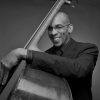Home » Jazz Musicians » McCoy Tyner
McCoy Tyner

It is not an overstatement to say that modern jazz has been shaped by the music of McCoy Tyner. His blues-based piano style, replete with sophisticated chords and an explosively percussive left hand has transcended conventional styles to become one of the most identifiable sounds in improvised music. His harmonic contributions and dramatic rhythmic devices form the vocabulary of a majority of jazz pianists.
Born in 1938 in Philadelphia, he became a part of the fertile jazz and R&B scene of the early ‘50s. His parents imbued him with a love for music from an early age. His mother encouraged him to explore his musical interests through formal training.
At 17 he began a career-changing relationship with Miles Davis’ sideman saxophonist John Coltrane. Tyner joined Coltrane for the classic album My Favorite Things (1960), and remained at the core of what became one of the most seminal groups in jazz history, The John Coltrane Quartet. The band, which also included drummer Elvin Jones and bassist Jimmy Garrison, had an extraordinary chemistry, fostered in part by Tyner’s almost familial relationship with Coltrane.
From 1960 through 1965, Tyner’s name was propelled to international renown, as he developed a new vocabulary that transcended the piano styles of the time, providing a unique harmonic underpinning and rhythmic charge essential to the group's sound. He performed on Coltrane’s classic recordings such as Live at the Village Vanguard, Impressions and Coltrane’s signature suite, A Love Supreme.
In 1965, after over five years with Coltrane's quartet, Tyner left the group to explore his destiny as a composer and bandleader. Among his major projects is a 1967 album entitled The Real McCoy, on which he was joined by saxophonist Joe Henderson, bassist Ron Carter and fellow Coltrane alumnus Elvin Jones. His 1972 Grammy-award nomination album Sahara, broke new ground by the sounds and rhythms of Africa. Since 1980, he has also arranged his lavishly textured harmonies for a big band that performs and records when possible. In the late 1980s, he mainly focused on his regular piano trio featuring Avery Sharpe on bass and Aarron Scott on drums. As of today, this trio is still in great demand. He returned to Impulse in 1995, with a superb album featuring Michael Brecker. In 1996 he recorded a special album with the music of Burt Bacharach. In 1998 he changed labels again and recorded an interesting latin album and an album featuring Stanley Clarke for TelArc.
Read moreTags
McCoy Tyner: Falling In Love With Love

by Artur Moral
Despite sharing some common stylistic territories, contemporary jazz giants McCoy Tyner and David Murray collaborated on just three recording projects. One of them is 44th Street Suite (Red Baron, 1991), a release produced by Bob Thiele, who also orchestrated their first recorded encounter on the little-known collective album A Tribute To John Coltrane / Blues For Coltrane (Impulse!, 1988). On this occasion, Tyner explicitly leads an enjoyable--but odd-sounding--session that moves with exultation from blues to free jazz, passing ...
Continue ReadingMcCoy Tyner / Joe Henderson: Forces Of Nature: Live At Slugs'

by Joshua Weiner
How does one go about nominating Zev Feldman for a Nobel Peace Prize? Time and again, the intrepid “Jazz Detective" tracks down unknown, unheard, un-even-hoped-for sonic artifacts, painstakingly brushes away the audio dust and grime, and puts us front and center at events that rewrite the history of jazz. Forces of Nature: Live at Slugs' another Feldman's project, in collaboration with Blue Note President Don Was, is quite possibly his greatest, a double album of such excitement, beauty, and power ...
Continue ReadingMcCoy Tyner, Joe Henderson, Sara Serpa and Altus

by Hobart Taylor
Blue Note unearths historic recordings from jazz giants McCoy Tyner and Joe Henderson and we feature new music from Sara Serpa and Bryan Lynch.Playlist Meshell Ndegeocello" Tsunami Rising" from No More Water The Gospel of James Baldwin (Blue Note) 0:00 Host Speaks 8:04 Meshell Ndegeocello “On The Mountain" No More Water: The Gospel of James Baldwin (Blue Note) 9:03 Meshell Ndegeocello “Baldwin Manifesto 1" No More Water : The Gospel of James Baldwin (Blue Note) 15:02 Derek Bermel ...
Continue ReadingMcCoy Tyner / Joe Henderson: Forces Of Nature: Live At Slugs'

by Mike Jurkovic
When recordings like Forces of Nature: Live at Slugs' seemingly falls from yonder jazz sky, we must stop to thank those swinging stars above for our grand fortune. Because despite all our flaws--a broken politic, a poisoned planet, constant wartime bickering--we are a fortunate, if mostly undeserving, race of peculiarities. That becomes especially apparent when random, instantaneous works of art and human affinity like this grace our path. Located at 242 East 3rd Street between Avenue B and ...
Continue ReadingJohn Coltrane: Sun Ship

by Mark Corroto
Why is a 180-gram vinyl reissue of John Coltrane's Sun Ship, remastered from the original tapes, important? If you are old enough, you'll remember the advent of the compact disc. After the CD was introduced in the 1980s, listeners abandoned their vinyl collections in favor of the promise of this new technology which was free from the nasty clicks and pops their LPs delivered. What they gave up in the name of cleanliness did come at a cost, and we're ...
Continue ReadingJohn Coltrane: Evenings At The Village Gate

by Mike Jurkovic
All music is, as are all our greater gestures and pursuits--poetry, painting, literature, sculpture, dance--spiritual by nature. An outreach by the artist and thus, by extension, us, beyond the daily argot of the ordinary. But sometimes those instances are so far and in-between, so masked by the lawlessness of the present moment, that our higher selves are forgotten, or worse, denied. And sometimes the music is downright holy. Welcome to the church known as the Village Gate. Welcome ...
Continue ReadingJohn Coltrane: Evenings At The Village Gate

by Chris May
It is important to emphasize, at the outset of this review, that Evenings At The Village Gate is a John Coltrane album of headline significance. Recorded during a four-week run at the New York City club in August and September 1961, the disc is a snapshot of Coltrane partway through the most momentous year of his development. He is in incandescent form from start to finish, leading an astounding sextet completed by multi-reedist Eric Dolphy, pianist McCoy Tyner, twin bassists ...
Continue ReadingJazz Musician of the Day: McCoy Tyner

Source:
Michael Ricci
All About Jazz is celebrating McCoy Tyner's birthday today!
It is not an overstatement to say that modern jazz has been shaped by the music of McCoy Tyner. His blues-based piano style, replete with sophisticated chords and an explosively percussive left hand has transcended conventional styles to become one of the most identifiable sounds in improvised music. His harmonic contributions and dramatic rhythmic devices form the vocabulary of a majority of jazz pianists. Born in 1938 in Philadelphia, he became ...
read more
McCoy Tyner and Freddie Hubbard, 1986

Source:
JazzWax by Marc Myers
In 1986, Fabrik—or Factory—stood on the west side of Hamburg, Germany, in the Altona district. Back then, the former machine-parts factory was a cultural center frequented by young people in the left-wing eco-movement and by those on the right, depending on what was on the bill at the performance space. Sometimes the two groups converged when the performers appealed to both groups. As a result, Fabrik's programs were often highly diverse, ranging from pop and ska to punk and jazz. ...
read more
Jazz Musician of the Day: McCoy Tyner

Source:
Michael Ricci
All About Jazz is celebrating McCoy Tyner's birthday today!
It is not an overstatement to say that modern jazz has been shaped by the music of McCoy Tyner. His blues-based piano style, replete with sophisticated chords and an explosively percussive left hand has transcended conventional styles to become one of the most identifiable sounds in improvised music. His harmonic contributions and dramatic rhythmic devices form the vocabulary of a majority of jazz pianists. Born in 1938 in Philadelphia, he became ...
read more
Jazz Musician of the Day: McCoy Tyner

Source:
Michael Ricci
All About Jazz is celebrating McCoy Tyner's birthday today!
It is not an overstatement to say that modern jazz has been shaped by the music of McCoy Tyner. His blues-based piano style, replete with sophisticated chords and an explosively percussive left hand has transcended conventional styles to become one of the most identifiable sounds in improvised music. His harmonic contributions and dramatic rhythmic devices form the vocabulary of a majority of jazz pianists. Born in 1938 in Philadelphia, he became ...
read more
Video: McCoy Tyner, 1986

Source:
JazzWax by Marc Myers
Yesterday, Jimi Mentis sent along a link to a terrific concert video featuring pianist McCoy Tyner with trumpeter Freddie Hubbard, tenor saxophonist Joe Henderson, bassist Avery Sharpe and drummer Louis Hayes. The concert was recorded at the Jazz Ost-West Festival in Nürmberg, Germany, in 1986. The songs were Birdlike, Just Feeling, As Me Now, Caravan and Inner Glimpse. Here's where the songs fall along the time bar: Birdlike at 00:00 (full quintet), Just Feeling at 05:25 (just the trio), As ...
read more
Jazz Musician of the Day: McCoy Tyner

Source:
Michael Ricci
All About Jazz is celebrating McCoy Tyner's birthday today!
It is not an overstatement to say that modern jazz has been shaped by the music of McCoy Tyner. His blues- based piano style, replete with sophisticated chords and an explosively percussive left hand has transcended conventional styles to become one of the most identifiable sounds in improvised music. His harmonic contributions and dramatic rhythmic devices form the vocabulary of a majority of jazz pianists... Read more.
Place our Musician of ...
read more
Jazz Musician of the Day: McCoy Tyner

Source:
Michael Ricci
All About Jazz is celebrating McCoy Tyner's birthday today!
It is not an overstatement to say that modern jazz has been shaped by the music of McCoy Tyner. His blues- based piano style, replete with sophisticated chords and an explosively percussive left hand has transcended conventional styles to become one of the most identifiable sounds in improvised music. His harmonic contributions and dramatic rhythmic devices form the vocabulary of a majority of jazz pianists... Read more.
Place our Musician of ...
read more
Jazz Musician of the Day: McCoy Tyner

Source:
Michael Ricci
All About Jazz is celebrating McCoy Tyner's birthday today!
It is not an overstatement to say that modern jazz has been shaped by the music of McCoy Tyner. His blues- based piano style, replete with sophisticated chords and an explosively percussive left hand has transcended conventional styles to become one of the most identifiable sounds in improvised music. His harmonic contributions and dramatic rhythmic devices form the vocabulary of a majority of jazz pianists... Read more.
Place our Musician of ...
read more
McCoy Tyner: Ballads & Blues

Source:
JazzWax by Marc Myers
Pianist McCoy Tyner is best known for being a member of the John Coltrane Quartet beginning in 1960. During those years, Tyner re-invented the piano as a highly percussive, stirring instrument that churned the waters for Coltrane's abstraction and spiritual solos. For some strange reason, in late 1962 and the first half of 1963, Tyner was commissioned by producer Bob Thiele to record more straightforward jazz albums as a leader. These albums included Reaching Fourth, Today and Tomorrow and McCoy ...
read more
Jazz Musician of the Day: McCoy Tyner

Source:
Michael Ricci
All About Jazz is celebrating McCoy Tyner's birthday today!
It is not an overstatement to say that modern jazz has been shaped by the music of McCoy Tyner. His blues- based piano style, replete with sophisticated chords and an explosively percussive left hand has transcended conventional styles to become one of the most identifiable sounds in improvised music. His harmonic contributions and dramatic rhythmic devices form the vocabulary of a majority of jazz pianists... Read more.
Place our Musician of ...
read more




































































































































































